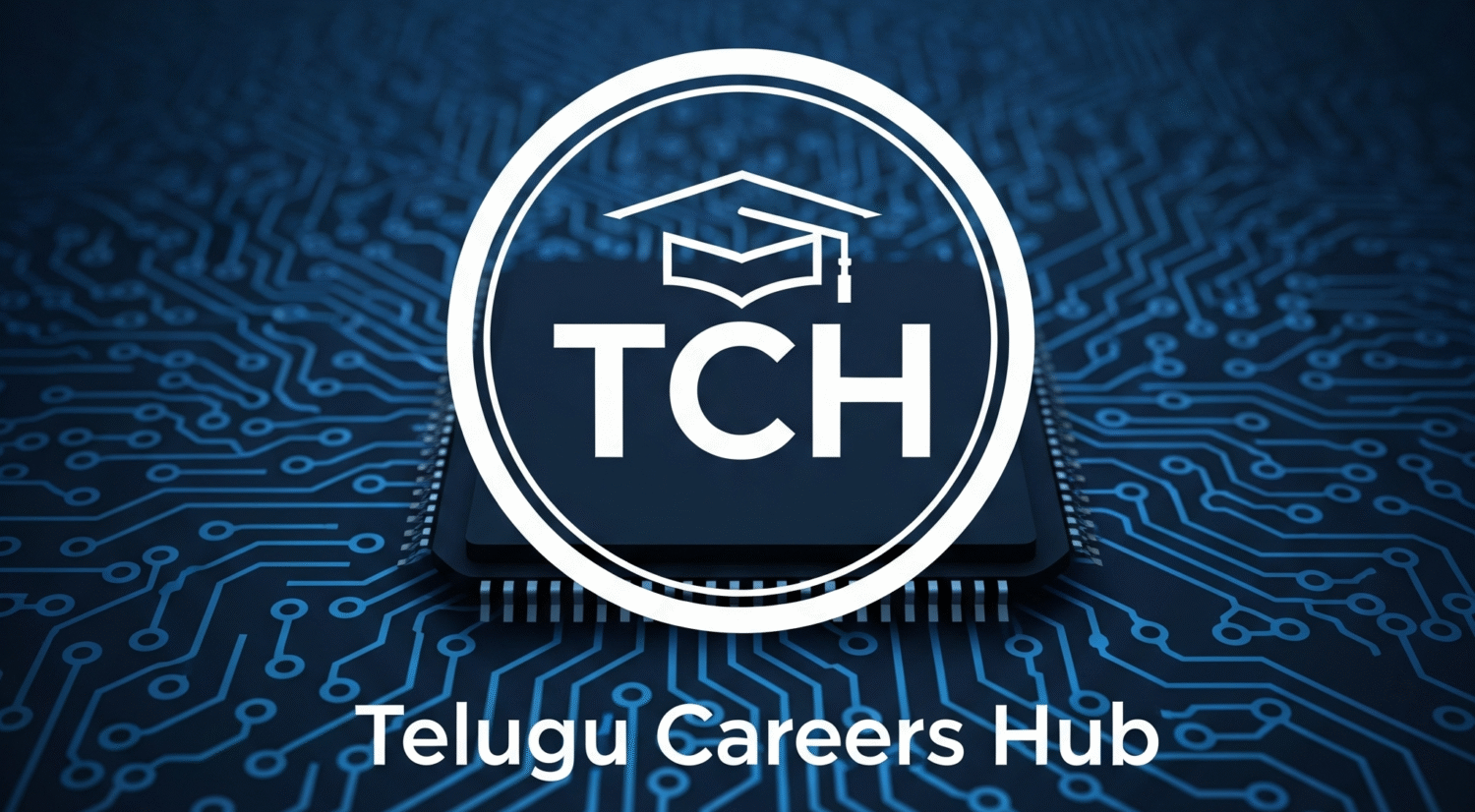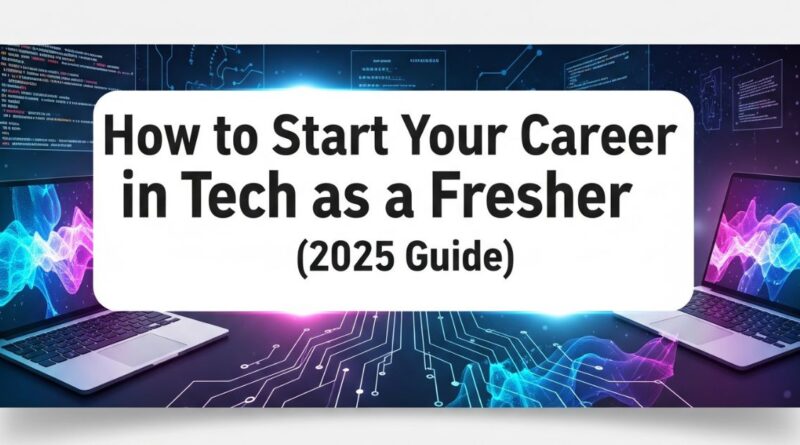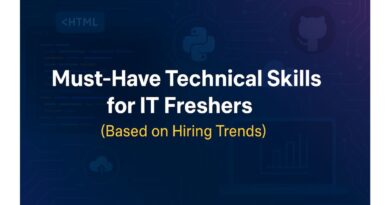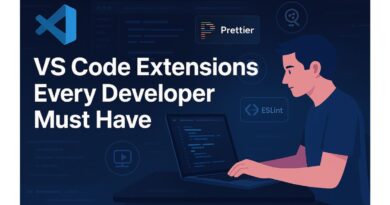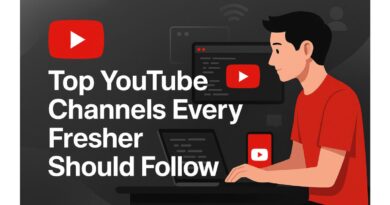How to Start Your Career in Tech as a Fresher (2025 Guide)
How to Start Your Career in Tech as a Fresher (2025 Guide)
🚀 Welcome to Your Tech Journey: Let’s Begin
Are you wondering how to start a career in tech as a fresher in 2025? You’re not alone. Every year, thousands of students graduate with dreams of entering the booming tech world but are unsure where to start. Whether you have a tech degree or not, breaking into this industry is absolutely possible—even if you have zero experience.
This Tech Career Guide for Freshers 2025 will show you exactly what steps to take, how to make smart decisions, and where to focus your energy to get that first IT job. Let’s decode your journey into tech with a step-by-step blueprint that’s beginner-friendly, up-to-date, and future-proof.
🧭 Section 1: Understanding the Tech Landscape in 2025
What’s New in the Tech Industry?
In 2025, the tech industry continues to evolve rapidly. Understanding current trends helps you align your learning path and stay ahead of the curve.
- Artificial Intelligence and Machine Learning: These are no longer niche; every company uses them in some form.
- Cloud Computing: AWS, Azure, and Google Cloud dominate.
- Cybersecurity: With data breaches rising, security professionals are in high demand.
- Low-Code/No-Code Development: More companies are hiring for tools like Bubble, Webflow, and Zapier.
- Remote Tech Roles: Global hiring has expanded opportunities for freshers.
Where Do Freshers Fit In?
- Tech companies are actively investing in fresh graduates through internships, training programs, and mentorship.
- Non-tech companies are building tech teams (EdTech, FinTech, HealthTech).
- Startups prefer freshers for their adaptability and lower salary expectations.
🎯 Section 2: Define Your Tech Goals
Ask Yourself the Right Questions
Before jumping into any course or applying blindly, pause and reflect:
- What excites me more—building products or analyzing data?
- Do I enjoy creative design or logical problem-solving?
- Would I prefer coding all day or managing infrastructure?
Choose Your Path:
Choosing the right domain can save you months of confusion. Here are a few common beginner-friendly domains:
- Software Developer: Ideal for problem-solvers who enjoy coding.
- Frontend/Backend Developer: Great for those who love websites or logic.
- UI/UX Designer: If you’re visually creative and love psychology/design.
- DevOps Engineer: Perfect for people interested in automation and infrastructure.
- QA/Testing: For those who enjoy finding bugs and ensuring quality.
- Cloud Engineer: Work on virtual servers, cloud storage, and deployment.
- Data Analyst/Scientist: Perfect if you enjoy working with numbers and patterns.
- Cybersecurity Analyst: Best for those interested in protection, hacking, and privacy.
📘 Section 3: Learn the Right Skills (Even Without a Degree)
You Don’t Need Experience—You Need Skills
To start a tech career without experience, you must develop foundational skills that align with your chosen path.
- Programming Languages:
- Python: Great for beginners and data science.
- JavaScript: Web development must-have.
- Java/C++: Common in CS degrees and backend roles.
- Web Development:
- HTML/CSS for structure and design.
- JavaScript + React for frontend frameworks.
- Node.js, Express for backend basics.
- Version Control:
- Git commands (clone, commit, push, pull).
- GitHub: Create repos, branches, and contribute.
- Databases:
- SQL: Most used for relational data.
- MongoDB: Popular NoSQL database.
- Problem Solving:
- Data Structures (arrays, stacks, queues).
- Algorithms (sorting, searching, recursion).
Where to Learn
- Free Resources:
- YouTube: Apna College, CodeWithHarry, Academind
- Harvard CS50 (edX)
- freeCodeCamp
- Paid Courses:
- Udemy: Affordable and diverse topics.
- Scaler Academy, Newton School: Structured with placements.
- Coursera: University-certified programs.
🧪 Section 4: Build Real Projects That Matter
Don’t Just Learn—Apply It
Building projects proves to employers that you can think and execute.
- Mini Projects:
- To-do app
- Weather app (API-based)
- Currency converter
- Clone Projects:
- Netflix UI Clone
- Instagram Photo Feed Clone
- Amazon Shopping Cart Clone
- Problem-Solving Projects:
- Quiz app
- Chat app with WebSockets
- Open Source Contributions:
- Participate in Hacktoberfest
- Join GitHub repos (check labels like “good first issue”)
💼 Section 5: Create a Job-Ready Resume
What Should Your Resume Include?
Even if you have no job experience, your resume can shine.
- Professional Summary: Highlight tech stack and aspirations.
- Skills: Categorize into programming, tools, soft skills.
- Projects: Add GitHub links, tech used, outcome.
- Education & Certifications: Include online courses.
- Achievements: Hackathons, coding contests, volunteer work.
Resume Building Tips:
- Keep it one page (for freshers).
- Use action words: Built, Developed, Integrated, Analyzed.
- Export to PDF and keep file names clean (e.g., YourName_Resume.pdf).
🌐 Section 6: Set Up Your Online Presence
Be Seen by Recruiters, Even Before You Apply
- LinkedIn:
- Use a professional photo.
- Add headline: “Aspiring Web Developer | Open to Work”
- Share weekly learning updates.
- GitHub:
- Pin 6 relevant repositories.
- Keep commit history active.
- Portfolio Website:
- Add About, Skills, Projects, Contact form.
- Host on GitHub Pages, Netlify, or Vercel.
Bonus Visibility Tips:
- Write 1 blog a week on what you learned.
- Join tech Telegram and Discord groups.
- Attend online events and tag companies you like.
🧑💼 Section 7: Apply for Entry-Level Tech Jobs in 2025
Best Platforms for Fresher IT Jobs Guide
- LinkedIn: Daily job updates, filters for freshers.
- Naukri & Monster: Add relevant keywords to your profile.
- AngelList (Wellfound): For startup tech roles.
- Hirect App: Direct chat with founders & HRs.
- Company Career Pages: TCS, Infosys, Zoho, Wipro, and more.
Application Tips:
- Apply to 10–15 jobs daily.
- Customize your resume for every job.
- Always attach a cover letter.
- Track your applications using a Google Sheet.
🧠 Section 8: Prepare for Interviews (Tech + HR)
Technical Interviews
- Practice 2–3 DSA problems daily.
- Use platforms: LeetCode, HackerRank, InterviewBit.
- Revise:
- Arrays, Strings, Trees
- Sorting, Searching
- Time and Space Complexity
- Understand:
- REST APIs
- OOPs Concepts
- Basic DBMS and Networking
HR Interviews
- Tell me about yourself: Keep it 60–90 seconds.
- Why should we hire you?
- Describe a challenging situation and how you overcame it.
📊 Section 9: Internships & Freelance Gigs: Your First Break
Why Internships Matter
- Internships are the best way to learn workplace etiquette.
- Real-world exposure helps build confidence.
- Many internships lead to PPOs (pre-placement offers).
Where to Find Them
- Internshala: Filter by tech & stipend.
- LinkedIn: Search “Internship” with filters.
- AngelList: Apply to early-stage startups.
- Turing, Toptal (after some experience): Global freelance gigs.
💡 Section 10: Stay Updated and Keep Learning
Tech Changes Fast. So Should You.
To stay relevant in the tech industry:
- Newsletters:
- TLDR Tech
- DevBytes
- CodeNewbie Weekly
- Communities:
- CodeNewbie
- Hashnode Dev Community
- Discord groups like EddieHub
- YouTube:
- Fireship (for dev news)
- TechWithTim (Python)
- Amigoscode (Java + Spring)
Track Your Growth
- Use Notion to create a learning tracker.
- Start a “100 Days of Code” challenge.
- Record video logs of your journey to share online.
🎯 Final Thoughts: Believe in the Process
Starting your tech career as a fresher in 2025 doesn’t need a silver spoon—it needs a smart, consistent approach. You don’t need to be perfect. You just need to show progress. Whether your goal is to land entry-level tech jobs in 2025 or start a tech career without experience, the roadmap is within reach.
Stay hungry, humble, coding.
